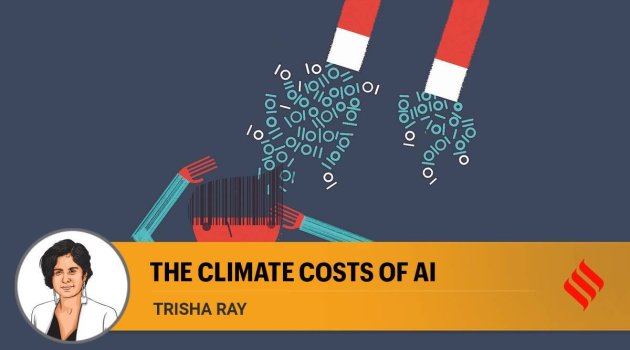We often think of artificial intelligence (AI) technologies as a gateway to a future written in chrome, operating on a virtual cloud. This techno-optimism underpinned FM Nirmala Sitharaman’s 2022 budget speech, where AI was described as a sunrise technology that would “assist sustainable development at scale and modernize the country.” While there is an allure to national dreams of economic prosperity and global competitiveness, underwritten by AI, there is an environmental cost and — like any issue at the nexus of technology, development, growth and security — a cost that comes with being locked into rules about said environmental impact set by powerful actors.
The “race” for dominance in AI is far from fair: Not only do a few developed economies possess certain material advantages right from the start, they also set the rules. They have an advantage in research and development, and possess a skilled workforce as well as wealth to invest in AI. North America and East Asia alone account for three-fourths of global private investment in AI, patents and publications.
We can also look at the state of inequity in AI in terms of governance: How “tech fluent” are policymakers in developing and underdeveloped countries? What barriers do they face in crafting regulations and industrial policy? Are they sufficiently represented and empowered at the international bodies that set rules and standards on AI? At the same time, there is an emerging challenge at the nexus of AI and climate change that could deepen this inequity.
Continue reading: https://indianexpress.com/article/opinion/columns/artificial-intelligence-technologies-have-climate-cost-7753829/
The “race” for dominance in AI is far from fair: Not only do a few developed economies possess certain material advantages right from the start, they also set the rules. They have an advantage in research and development, and possess a skilled workforce as well as wealth to invest in AI. North America and East Asia alone account for three-fourths of global private investment in AI, patents and publications.
We can also look at the state of inequity in AI in terms of governance: How “tech fluent” are policymakers in developing and underdeveloped countries? What barriers do they face in crafting regulations and industrial policy? Are they sufficiently represented and empowered at the international bodies that set rules and standards on AI? At the same time, there is an emerging challenge at the nexus of AI and climate change that could deepen this inequity.
Continue reading: https://indianexpress.com/article/opinion/columns/artificial-intelligence-technologies-have-climate-cost-7753829/

